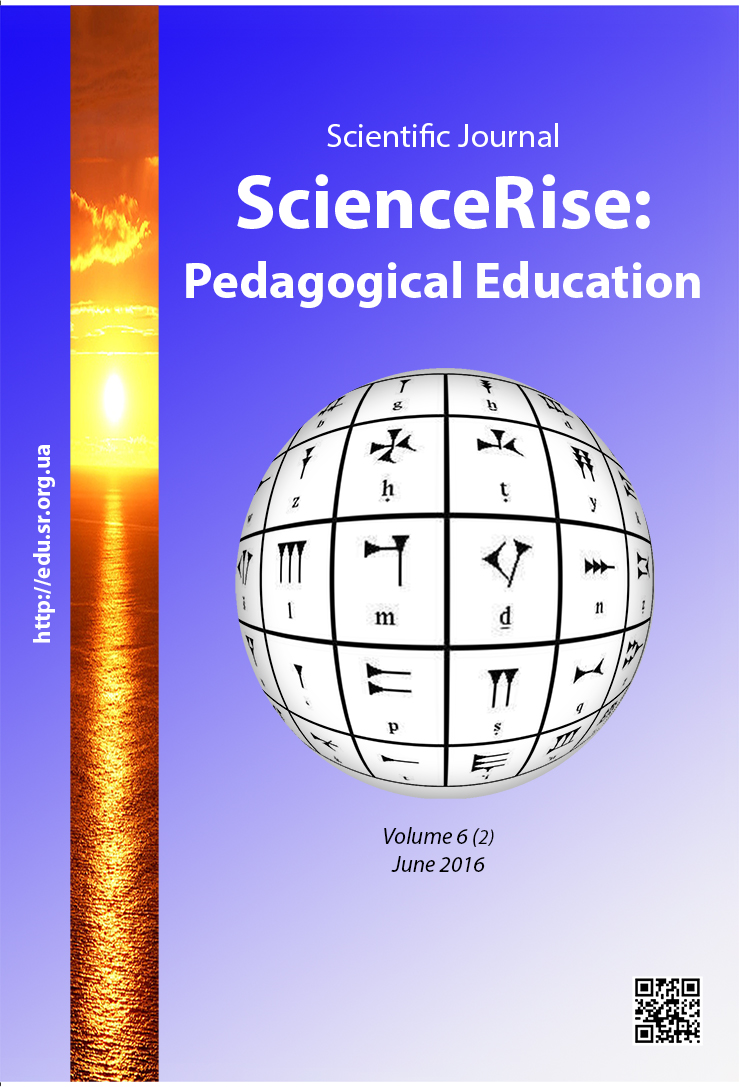The principles of higher education transormation and the higher medical school of Ukraine
DOI:
https://doi.org/10.15587/2519-4984.2016.72402Keywords:
higher medical education in Ukraine, educational transformation, competence approach, the principle of humanizationAbstract
The article deals with contemporary medical education in Ukraine. In the late twentieth and early twenty-first century, higher medical education in Ukraine has undergone essential changes. These changes affect the system of education, and the educational process, and most importantly, those guidelines and criteria by which alteration occurs in the sphere of education. The goal of the research is to identify the most important principles of its restructuring for the modern development of higher medical education in Ukraine; to analyze and evaluate their role in the restructuring of higher medical education. Researchers identify two kinds of personal qualities that have to orientate higher education according to the above principles. On the one hand, modern society needs people who can independently make responsible decisions in a situation of choice, foreseeing their possible consequences. On the other hand, higher education should train professionals who do not neglect their national culture and traditions as well as universal values, world culture, and develop their moral qualities. These two orientations are reflected in competence approach to the aims and contents of learning, as well as in humanization of higher medical education, in forming students’ culture on humanistic principles. It is concluded that medical education in its professional orientation embodies competence-based approach and the principle of humanization most naturally. Thus, medical education has the ability to combine new principles with traditional approaches in a harmonious way and to base innovation on the solid ground of traditions
References
- Maksimenko, S. D., Filonenko, M. M. (2014). Pedagogika vyshchoyi medichnoyi osvity [Pedagogics of higher medical education]. Kyiv: «Centr uchbovoi' literatury», 288.
- Moskalenko, V. F., Ponomarenko, V. M., Zimenkovskiy, A. B. (2005). Bazoviy terminologichniy glossariy systemy vyshchoyi medychnoyi osvity Ukrayiny [Basic terminological glossary of higher medical education of Ukraine]. Lviv: Liga-Pres, 175.
- Mileryan, V. Ye. (2003). Metodychni osnovy pidgotovky ta provedenya navchalnyh zanyat v medychnyh vuzah [Methodic grounds of preparation and training in medical schools]. Kyiv, 80.
- Andrushchenko, V. P. (2014). Pedagogika maybutnyogo – pedagogika kompromisu [Pedagogy of the future – pedagogy of compromise]. Vyshcha osvita Ukrayiny, 1/3 (54), 16–18.
- Romanenko, M. I. (2003). Sotsialni ta paradigmalno-kognityvni determinanty rozvitku suchasnoyi osvity [Social and paradigm-cognitive determinants of the development of modern education]. Dnipropetrovsk, 32.
- Pinchuk, Ye. A. (2010). Modernizatsiya ukrayinskoyi systemy osvity yak teoretyko-filosofska i praktychna problema [Modernization of Ukrainian system of education as a theoretical-philosophical and practical problem]. Kyiv, 33.
- Andrushchenko, V. P., Peredbors'ka I. (Eds.) (2009). Filosofiya osvity [Philosophy of education]. Kyiv: Vyd-vo NPU imeni M. P. Dragomanova, 329.
- Pryhodko, V. V. (2014). Strategiya reformy natsionalnoyi vyshchoyi shkoly [Reform strategy of the national high school]. Dnipropetrovsk: Zhurfond, 457.
- Kucherenko, D. G., Martynyuk, O. V. (2011). Strategiya rozvitku osvitnih system svitu [The development strategy of the world educational systems]. Kyiv: IPK, DSZU, 312.
- Lugovyi, V. I., Slyusarenko, O. M., Talanova, Zh. V. (2014). Stanovlenya systemy osnovnyh ponyat i kategoriy kompetentisnogo pidhodu v umovah paradygmalnyh zmin v osviti [The formation of basic concepts and categories of the competence approach in the conditions of paradigmatic change in education]. Pedagogics and psychology, 2, 14–24.
- Kinash, R. I., Gladyshev, D. G. (2006). Vyshcha osvita Ukrayiny I Bolonskiy process [Higher education of Ukraine and Bologna process]. Lviv, 66.
- Klak, I. Ye. (2015). Teoretychni zasady kompetentisnogo pidhodu v systemi vyshchoyi profesiynoyi osvity [The theoretical basis of the competence approach in higher professional education]. Bulletin of Chernihiv national pedagogical University, 124, 32–34.
- Lunyachek, V. Ye. (2013). Kompetentisnyi pidhid yak metodologiya profesiynoyi pidgotovky u vyshchiy shkoli [Competence approach as the methodology of the training in higher school]. Public administration: theory and practice, 1, 155–162.
- Tretyakova, T. M. (2014). Proces gumanizatsii yak osnova reformuvannya systemy vyshchoyi osvity Ukrayiny [The process of humanization as the basis for reforming higher education system of Ukraine]. Odesa, 19.
- Avtomonov, P. P. (2012). Strategichnyi pryntsip gumanizatsii vyshchoyi osvity I taktika yogo realizatsii [The strategic principle of humanization of higher education and tactics of its implementation]. Actual problems of sociology, psychology, pedagogy. Kyiv: Logos, 227.
- Boychenko, N. M. (2016). Etychni tsinnosti suchasnoyi universitetskoyi osvity: filosofska rafleksiya [Ethical values of modern University education: a philosophical reflection]. Kyiv, 35.
- Ryzhak, L. V. (2008). Gumanizatsiya vyshchoyi osvity Ukrayiny v konteksti Bolonskogo protsesu [Humanization of higher education of Ukraine in the context of Bologna process]. Socio-humanitarian problems of person, 3, 14–22.
- Fialko, N. A. (2015). Gumanizatsiya vyshchoyi osvity: zmistovno-funktsionalni aspekty [Humanization of higher education: the substantive and functional aspects]. Kyiv, 20.
Downloads
Published
How to Cite
Issue
Section
License
Copyright (c) 2016 Тетяна Іванівна Кир’ян

This work is licensed under a Creative Commons Attribution 4.0 International License.
Our journal abides by the Creative Commons CC BY copyright rights and permissions for open access journals.
Authors, who are published in this journal, agree to the following conditions:
1. The authors reserve the right to authorship of the work and pass the first publication right of this work to the journal under the terms of a Creative Commons CC BY, which allows others to freely distribute the published research with the obligatory reference to the authors of the original work and the first publication of the work in this journal.
2. The authors have the right to conclude separate supplement agreements that relate to non-exclusive work distribution in the form in which it has been published by the journal (for example, to upload the work to the online storage of the journal or publish it as part of a monograph), provided that the reference to the first publication of the work in this journal is included.







